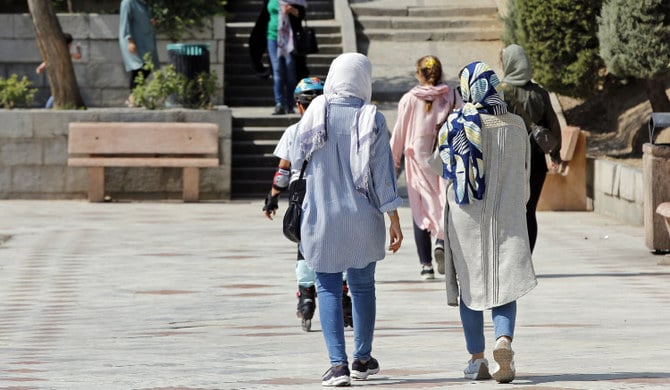
Since the US withdrew from the nuclear deal and the White House implemented its maximum pressure strategy, Iran has experienced rapidly worsening socioeconomic conditions, as well as multiple other crises. The outbreak of the coronavirus adds another dimension to the situation facing Iran and has led to the country deteriorating rapidly over the last few weeks, aggravating the misery of the Iranian people.
From a humanitarian perspective, some Gulf states have offered aid to Iran. But the virus has spread while Tehran is still dealing with unprecedented crises. Facing popular discontent due to the deteriorating socioeconomic conditions late last year, the government launched an intense crackdown, leading to mass arrests and deaths. And the coronavirus has cast a dark cloud over the country while the government is still struggling to deal with tightening US sanctions and the dent to its regional plans in the aftermath of the death of Qassem Soleimani.
One of the primary problems facing the government is that it is now in uncharted territory. It is skilled in politicizing crises to divert public attention and maintain its rapidly eroding legitimacy, but the coronavirus has left the government in deep trouble as it has struggled to provide an adequate response. The regime’s efforts to exploit the coronavirus crisis with its customary claims, conspiracy theories and propaganda have fallen flat. Indeed, the coronavirus crisis has exposed the unprecedented depth of the regime’s problems.
This being the case, if the regime looks at the vast dimensions of its crisis or crises, it will find no better opportunity than the present to reconsider its policies and behavior at home and overseas if it wishes to pull back from the brink of disaster.
It is illogical for the world to help Iran in overcoming the coronavirus crisis, which poses a severe threat to the country, while Tehran insists on continuing its hostile behavior and malign plans. It is also irrational that countries close their borders to contain the coronavirus while Iran’s regime continues to send its soldiers and proxies across the region to fight and spread sectarian hate and chaos under the guise of “exporting the revolution.”
The coronavirus crisis has exposed the unprecedented depth of the regime’s problems
Dr. Mohammed Al-Sulami
It should be emphasized that the whole world, including Iran’s Gulf neighbors, wish to help the country. For this reason, Kuwait and the UAE, consistent with the principles of cooperation and neighborliness that these countries are committed to upholding, offered aid to help Iran in overcoming the coronavirus crisis.
Iran’s regime should help itself too. This period provides a golden opportunity for the leadership to rethink and remember that any policy or plan that does not have popular support is ultimately doomed to failure. Similarly, any scheme to export hostility to the outside world is also destined for failure. The experience of the past 40 years proves that the Iranian regime has tightened the noose around the country’s neck and placed its own people under the guillotine of blockade and isolation — regressive steps that leave it lagging behind the rest of the world.
The killing of Soleimani had provided Iran with an excellent opportunity to reconsider its antagonistic behavior in the region. Likewise, the coronavirus crisis also offers Iran an opportunity to extend a hand of friendship to all its neighbors, and to demonstrate that it has the goodwill and ability to cooperate with others. The Iranian people would support the government in pursuing a more positive and cooperative policy with neighboring countries, and such a policy could revive the government’s legitimacy in the eyes of the public.
The regime’s usual policy of resorting to manipulation and deception is no longer logical or acceptable under the current circumstances. Many regional countries have collapsed due to Iranian interference, leaving them unable to combat a threat like the coronavirus. There is no doubt that the international community expects Iran to change its behavior, and the global spread of the coronavirus provides an apt opportunity for it to end its isolation and forge relationships to counter this threat to humanity.
Contrary to the Iranian media’s propaganda, nobody in the world wants to topple the regime or objects to Iran’s position as a normal state in the region. Iran’s leaders should view the world without wearing their narrow ideological spectacles that have created a mindset that is not aligned with reality. The current policies pursued by Iran’s leaders have failed to integrate the country into the region. The Gulf states are keen to ensure that the Iranian people are able to overcome the current coronavirus crisis. For this reason, they have extended their hand to the Iranian regime despite all its excesses, aggressive practices and antagonistic policies.
In return, Iran is expected to show goodwill and to understand that the solution to its crisis lies in re-establishing positive relations with neighboring states on the basis of cooperation, neighborliness, mutual respect and ceasing hostility. Any such change in behavior would serve the vital interests of the entire region and would be critical for Iran in particular, especially given the extensive crises it faces at home and overseas, with the coronavirus now threatening to further erode the legitimacy of the regime, leading to its possible collapse if it is not managed well.
• Dr. Mohammed Al-Sulami is Head of the International Institute for Iranian Studies (Rasanah). Twitter: @mohalsulami
Disclaimer: Views expressed by writers in this section are their own and do not necessarily reflect Arab News" point-of-view












